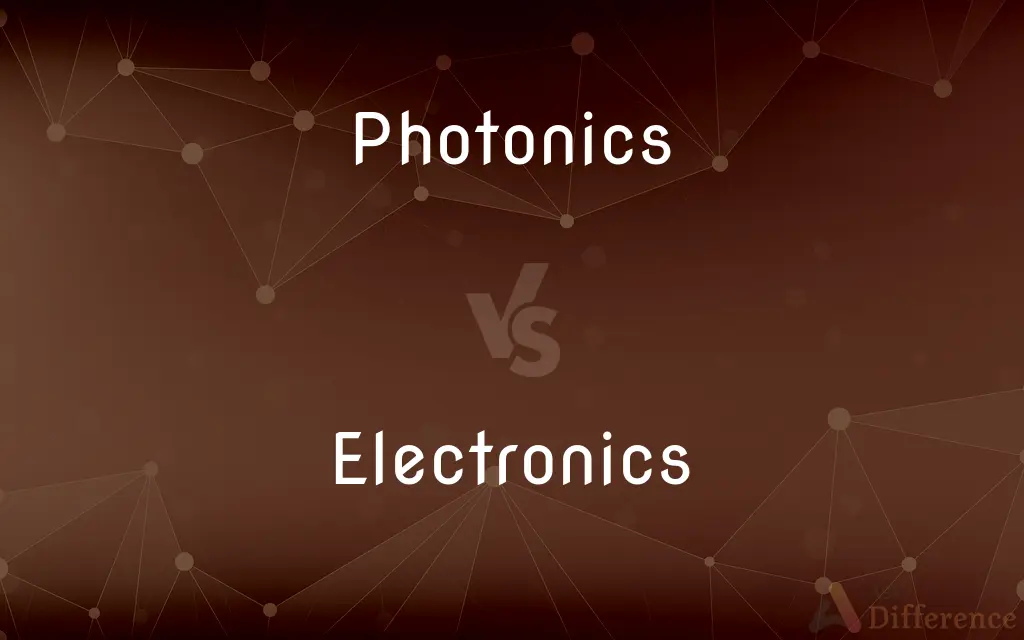Photonics vs. Electronics — What's the Difference?
Edited by Tayyaba Rehman — By Fiza Rafique — Published on November 19, 2023
Photonics involves the generation, manipulation, and detection of photons (light), while Electronics concerns the flow and control of electrons in devices.

Difference Between Photonics and Electronics
Table of Contents
ADVERTISEMENT
Key Differences
Photonics is a branch of science and technology that focuses on the generation, detection, and manipulation of photons, which are light particles. Electronics, on the other hand, revolves around the study, control, and application of the movement of electrons, primarily in solid-state devices such as transistors and diodes.
Photonics technologies include lasers, optical fibers, and photodetectors. These devices work on principles that rely on the behavior of photons. In contrast, Electronics encompasses devices like transistors, capacitors, and resistors that function based on the flow of electrons through them.
Photonics plays a significant role in modern communication systems, particularly in fiber-optic communications. These systems transmit data using light signals, making them faster and more efficient. Electronics, conversely, is foundational to most contemporary technologies, from computers to mobile phones, relying on the controlled flow of electrons to process and transmit information.
While Photonics mainly deals with the visible and infrared part of the electromagnetic spectrum, Electronics is not concerned with electromagnetic waves but rather with currents and voltages. It's notable, however, that the lines between Photonics and Electronics can blur, especially with devices like optoelectronic components that merge the principles of both fields.
Photonics has paved the way for advancements in fields like medicine, with tools such as laser surgeries and optical imaging. Electronics, being a more established field, has a broader range of applications, powering devices in almost every industry, from automotive to consumer electronics.
ADVERTISEMENT
Comparison Chart
Primary Particle
Photon (light particle)
Electron
Core Technologies
Lasers, optical fibers, photodetectors
Transistors, capacitors, resistors
Main Applications
Fiber-optic communications, laser surgeries
Computers, mobile phones, consumer devices
Concerns
Visible and infrared part of the electromagnetic spectrum
Currents and voltages
Interdisciplinary Areas
Optoelectronics
Microelectronics, power electronics
Compare with Definitions
Photonics
The science of generating, detecting, and manipulating light.
Photonics research has revolutionized telecommunications.
Electronics
The science and technology of electronic devices and circuits.
Electronics is the backbone of modern computing.
Photonics
The study of devices that emit, modulate, and detect light.
Photonics has introduced high-speed fiber-optic communication.
Electronics
The branch of physics and technology focused on circuits and signals.
The foundation of modern communication systems lies in Electronics.
Photonics
The branch of physics encompassing the behavior of photons.
Photonics has potential applications in quantum computing.
Electronics
A field dealing with devices that control the flow of electrons.
Electronics has shaped the modern entertainment industry.
Photonics
A field focused on the properties and applications of photons.
Photonics plays a critical role in modern medical devices.
Electronics
The design and application of devices and systems involving electrons.
Wearable technology is a growing sector within Electronics.
Photonics
The technology of using light to perform functions typically done by electrons.
With the rise of Photonics, we might see optical computing mainstreamed.
Electronics
The study of electron movement, primarily in solid-state devices.
Electronics advancements have made smartphones more powerful.
Photonics
The study or application of electromagnetic energy whose basic unit is the photon, using technology such as optics, lasers and other light sources, fiber optics, electrical engineering, and materials science in numerous applications including communications, electrical engineering, materials science, and information storage and processing.
Electronics
(used with a sing. verb) The science and technology of electronic phenomena.
Photonics
(sciences) The science and technology of generating and controlling photons, particularly in the visible and near infrared light spectrum.
Electronics
(used with a pl. verb) Electronic devices and systems
The electronics aboard the new aircraft are very sophisticated.
Electronics
(physics) The study and use of electrical devices that operate by controlling the flow of electrons or other electrically charged particles or by converting the flow of charged particles to or from other forms of energy.
Electronics is a popular subject.
Electronics
(in the plural) A device or devices which require the flow of electrons through conductors and semiconductors in order to perform their function; devices that operate on electrical power (battery or outlet)
Electronics
Electronic circuitry.
The electronics is the difference between a modern and an old-fashion thermostat.
The electronics are completely updated.
Electronics
The branch of physics that deals with the behavior of electrons. Electronics is primarily concerned with phenomena other than simple conduction, such as emission of electrons, storage of electrical charge, the effects of electrical fields on the conduction of electrons through a circuit, and amplification and manipulation of electric signals such as voltage or current by design of circuits. Electronics also encompasses the application of such fundamental principles to the construction of devices using the manipulation of electrons in their operation, known as electronic devices.
Electronics
The branch of engineering concerned with design of devices using the principles of electronics, for practical purposes.
Electronics
Electronic devices generally, or the electronic circuits within an electronic device.
Electronics
The branch of physics that deals with the emission and effects of electrons and with the use of electronic devices
Common Curiosities
Can Photonics and Electronics overlap?
Yes, especially in devices like optoelectronic components that combine principles from both fields.
What is the primary focus of Photonics?
Photonics focuses on the generation, detection, and manipulation of photons or light particles.
What role does Electronics play in modern technology?
Electronics is foundational to most modern technologies, from computers to phones.
Which field plays a significant role in fiber-optic communications?
Photonics is fundamental to fiber-optic communications.
Which field primarily deals with currents and voltages?
Electronics mainly deals with currents and voltages.
Are transistors a part of Photonics?
No, transistors are electronic devices and are a part of Electronics.
How does Electronics impact our daily lives?
Electronics powers a myriad of everyday devices, from TVs to smartphones.
What's an example of a Photonics application in medicine?
Laser surgeries and optical imaging are Photonics applications in medicine.
Which field has a longer history of development?
Electronics has a more extended history and broader range of applications.
And Electronics?
Electronics revolves around the movement and control of electrons, mainly in solid-state devices.
Are lasers considered a part of Photonics?
Yes, lasers are a core technology in the field of Photonics.
Can Photonics technologies work without Electronics?
While Photonics technologies primarily focus on light, many systems integrate electronic components for control and data processing.
Is optical computing related to Photonics?
Yes, optical computing is a potential application area for Photonics.
Is Photonics the future of computing?
Photonics offers promising advancements in computing, especially in high-speed data transfer, but it's seen as complementary to Electronics.
Can electronic devices run without Photonics?
Yes, many electronic devices operate without Photonics, but integrating the two can lead to enhanced performance in certain applications.
Share Your Discovery

Previous Comparison
Pancakes vs. Pikelets
Next Comparison
Cork Cambium vs. Vascular CambiumAuthor Spotlight
Written by
Fiza RafiqueFiza Rafique is a skilled content writer at AskDifference.com, where she meticulously refines and enhances written pieces. Drawing from her vast editorial expertise, Fiza ensures clarity, accuracy, and precision in every article. Passionate about language, she continually seeks to elevate the quality of content for readers worldwide.
Edited by
Tayyaba RehmanTayyaba Rehman is a distinguished writer, currently serving as a primary contributor to askdifference.com. As a researcher in semantics and etymology, Tayyaba's passion for the complexity of languages and their distinctions has found a perfect home on the platform. Tayyaba delves into the intricacies of language, distinguishing between commonly confused words and phrases, thereby providing clarity for readers worldwide.












































